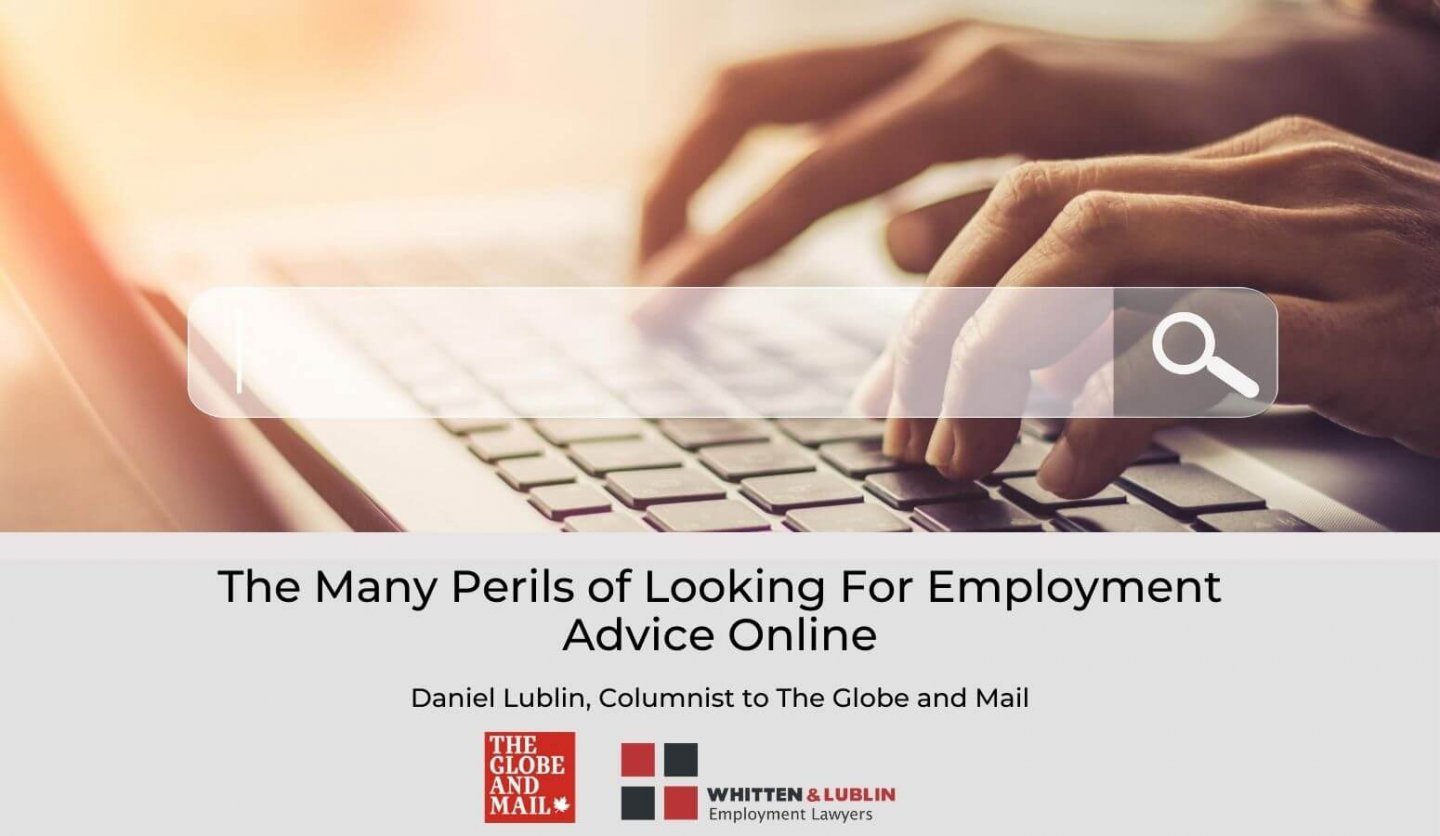
The Many Perils of Looking For Employment Advice Online
Lately, the Internet feels like a more dangerous place. Since the pandemic began, Statistics Canada reports that Canadians spend far more time online than ever before. Activities that once required us to venture outside are now performed in front of a computer screen. Similarly, workers and employers seeking professional advice on their workplace rights are searching for that employment advice online. Increasingly, this is cause for concern.
SALES PITCHES
Internet-based marketing has become so pervasive that it can be hard to distinguish between a sales pitch and a genuine description of the law. Based on my observations, about half of the top search results produced by the leading search engines are advertisements, and half of those advertisements are paid for by companies looking to sell products or services that are not directly relevant. Companies or workers looking for legal advice can quickly be led far off into the wrong direction.
For example, when I searched for “employment standards act advice”, the first several results were paid advertisements that appeared to mimic government websites but were actually networks that claimed to put me in touch with a lawyer who would quickly answer my questions once I paid a small fee. The problem with these websites is that the “lawyers” who respond to such inquiries are generally not in Canada, and they may not even be lawyers at all. Be careful not to fall into these traps which claim to offer employment advice online.
ADVERTISING RULES
Lawyers in Canada are governed by provincial regulatory bodies that place strict limits on how they are permitted to advertise online. For example, lawyers within Ontario are required to use a clear disclaimer when referring to past successes and they are forbidden from referring to awards or honours which were not credibly obtained by a legitimate third party. These rules are designed to protect consumers from being misled.
However, when researching for legal content online, it can be hard to detect an imposter. There is little stopping non-lawyers from advertising products or services, or even providing legal advice. These businesses dodge the regulatory requirements imposed on Canadian lawyers because they are not bound by them. For example, there is an international company offering workplace law advice to Canadian employers in Alberta, B.C., and Ontario. It does not actually consist of locally licensed lawyers because it does not follow any of the advertising rules in place. Without these safeguards, the public has no way to verify that certain professional standards are met – and no one to complain to if not.
JURISDICTIONAL ISSUES
Each jurisdiction in Canada has its own unique employment standards legislation. There are also important distinctions between provincially and federally regulated employees (i.e. employees working in banking or telecommunications) that are critical to obtaining correct advice. Therefore, while it may be tempting to research a quick answer to “how much termination pay am I entitled to”, the correct answer first requires a proper understanding of the relevant jurisdictional framework and background terms of employment. When I speak with any prospective client, I have a comprehensive checklist of questions that I first need to have answered before I can confidently provide accurate employment advice online or in-person.
CHANGES IN THE LAW
Even before COVID-19, workplace law was an extremely dynamic area, with constant changes to the law. However, since the pandemic began there is an almost-daily barrage of new developments and legislative amendments. The information posted online months or even weeks ago may no longer be precise. Search engine results are intended to be relevant – but they are not necessarily accurate.
THE WRONG QUESTION
Most internet searches for legal information are from individuals looking for a quick and simple answer to a legal problem they face. What is a constructive dismissal? How much severance pay should I receive? However, as any physician will tell you, the problem with self-diagnosis is that the underlying condition that you believe you have may be wrong. A temporary layoff may be a constructive dismissal for some employees. But if you are searching for whether it is a wrongful dismissal, which is a different legal concept, you may not receive the right answer.
Similarly, nuances in the law often require a more detailed explanation. There are actually separate and critically different meanings for severance pay in Canada. If you miss this distinction, your entire understanding of the concept will be wrong.
UNIONIZED WORKERS
Unionized employees cannot sue for wrongful dismissal but instead must file a grievance through their union. Without first qualifying this distinction, the answers to just about every online search for union workers will not be applicable to their matters.
The Internet is great for obtaining historical data points and a general direction of what to do next. But it is not a panacea for your workplace legal troubles. There is no substitute for actually conversing with a lawyer who can understand the nature of your problem and the dispute. Most law firms are now easily able to provide employment advice online.
Daniel A. Lublin is a founding partner of Whitten & Lublin Employment & Labour Lawyers in Toronto.
With years of experience in this ever-changing area of law, we at Whitten & Lublin are happy to provide insight and advice into your specific circumstances. If you’re looking for employment lawyers and would like more information about what Whitten & Lublin can do for you, please contact us online or by phone at (416) 640-2667 today.



